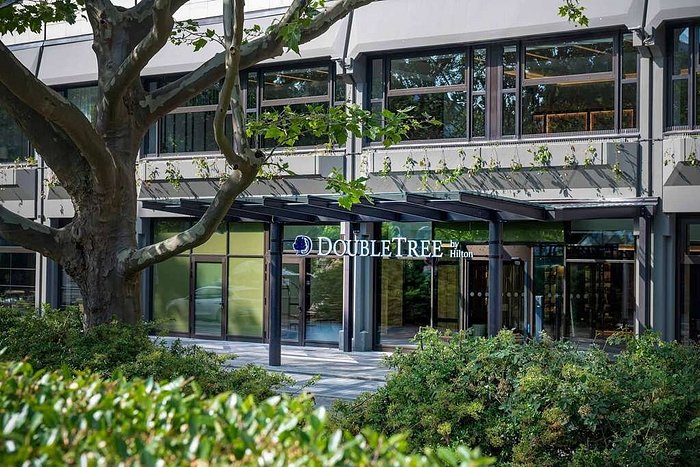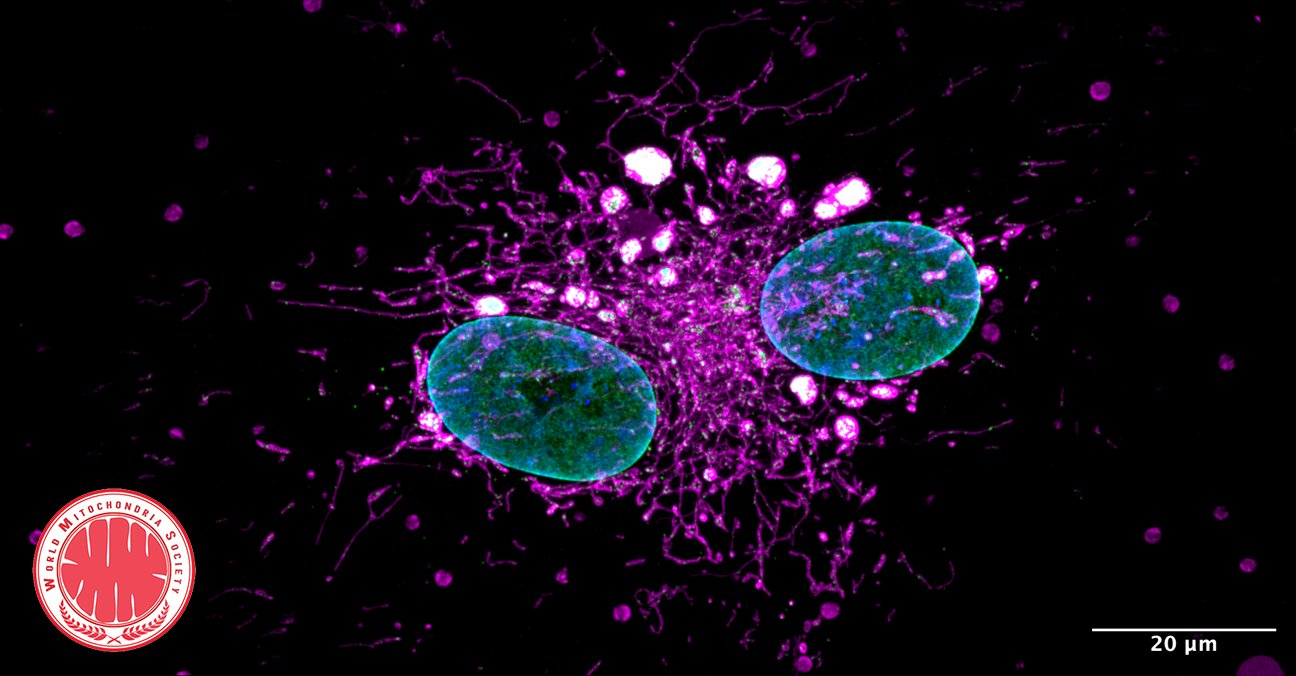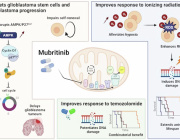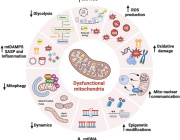Prof. Carsten Culmsee, Magburg University, Germany, awarded by the World Mitochondria Society
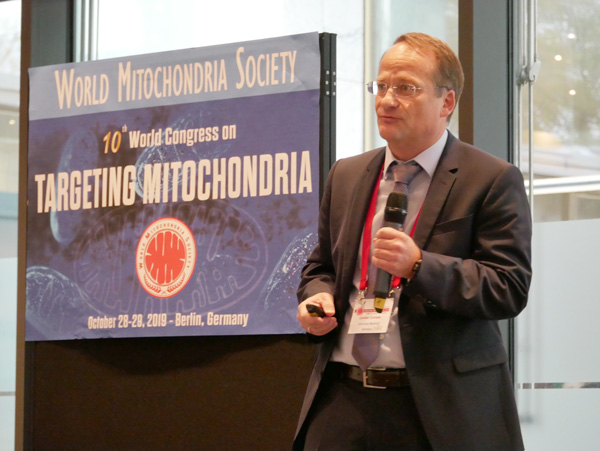
World Mitochondria Society is honored to announce the winner of the award for his exceptional scientific contribution for the year 2019, Prof. Carsten Culmsee, from the Magburg University, Germany.
Prof. Culmsee gave an excellent communication during the 10th World Congress on Targeting Mitochondria 2019, which was held in Berlin, Germany, about the role of actin-regulating proteins on mitochondria.
During Targeting Mitochondria 2019, Prof. Culmsee presented new data on the key role of actin-regulating proteins on mitochondrial integrity and function in health and disease of the nervous system and the heart. Also, his talk shows an involvement of mitochondria damage in iron-dependent regulated oxidative cell death called ferroptosis that has been identified in several different organs and tissues, including the nervous system.

For media information:
Media center: World Mitochondria Society
Contact: www.targeting-mitochondria.com
Targeting Mitochondria 2020: Present your Innovation
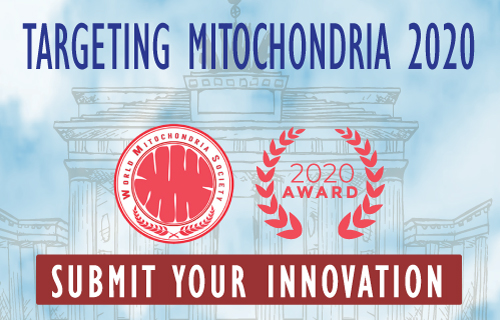 Targeting Mitochondria 2020 Scientific Committee invites scientists, academics and industrials to present all innovations and researches related to Mitochondria. Please submit your abstract by October 2, 2020.
Targeting Mitochondria 2020 Scientific Committee invites scientists, academics and industrials to present all innovations and researches related to Mitochondria. Please submit your abstract by October 2, 2020.
To register for Targeting Mitochondria 2020, please follow this link.
Targeting Mitochondria 2020 will organized as VIRTUAL Conference
Dear Colleagues,
After a long and thorough discussion among the scientific and organizing committees, we have decided to organize our 11th Conference of Targeting Mitochondria, on October 29-30, 2020 as an ONLY online meeting.
Targeting Mitochondria 2020 Meeting is not a webinar. All registered attendees will have access to the platform when they wish and at any time.
Targeting Mitochondria 2020 Virtual Meeting:
Practical Information
Pre-Recorded Contributions:
Due to restriction and time zone difference, a pre-recorded contribution can be separately viewed online from the date of the conference, October 29, 2020, until November 29th, via the use of access code.
Prior to the Conference:
- All Invited Speakers are being asked to record their 25 minutes talks via the conference platform.
- All Short Oral contributions accepted are being asked to record their 10 minutes talks.
- All Poster contributions accepted are being asked to record their 5 minutes talks and submit the poster in PDF Format.
Conference Platform:
All contributions accepted by the scientific committee will be added to the specific conference platform prior to the conference, as indicated in the session of the program.
How to Access to all Communications (à la Carte):
Upon registration, each pre-recorded contribution can be separately viewed online from the date of the conference, October 29, 2020 until November 29th, via the use of access code. The "à la carte" presentations can be viewed in the comfort of your place.
Awards:
As each year, 3 awards will be given: Best scientific contribution, Best short oral presentation and best poster presentation. The best poster will be selected by the vote of all virtual attendees.
Questions, Contact, and Networking:
The conference platform will allow each participant to contact speakers, attendees, and sponsors. If you wish to submit your questions to speakers, you can do it before the meeting.
Chairmen and Round Table Discussion:
The Chairmen of each session will record an overview of all talks of their session. You can send also your questions to chairmen.
Registration:
We updated the registration fees for this WMS 2020 virtual meeting.
If you wish to cancel your registration, please contact us for reimbursement.
You will receive a refund for the difference in the cost of registration or keep the difference for Targeting Mitochondria 2021 congress.
Please feel free to contact us with any questions you might have.
Best regards,
On behalf of
Prof. Volkmar Weissig
President of the World Mitochondria Society
Enhanced axonal response of mitochondria to demyelination offers neuroprotection: implications for multiple sclerosis
 Dr. Don Mahad from University of Edinburgh, United Kingdom, will join the Targeting Mitochondria 2020 Congress on October 29-30 which will be organized virtually and give a major presentation entitled "Enhanced axonal response of mitochondria to demyelination offers neuroprotection: implications for multiple sclerosis".
Dr. Don Mahad from University of Edinburgh, United Kingdom, will join the Targeting Mitochondria 2020 Congress on October 29-30 which will be organized virtually and give a major presentation entitled "Enhanced axonal response of mitochondria to demyelination offers neuroprotection: implications for multiple sclerosis".
Axonal loss is the key pathological substrate of neurological disability in demyelinating disorders, including multiple sclerosis (MS). However, the consequences of demyelination on neuronal and axonal biology are poorly understood. The abundance of mitochondria in demyelinated axons in MS raises the possibility that increased mitochondrial content serves as a compensatory response to demyelination.
Enhancement of ARMD, by targeting mitochondrial biogenesis and mitochondrial transport from the cell body to axon, protects acutely demyelinated axons from degeneration.
Enhancement of mitochondrial dynamics in complex IV deficient neurons protects the axon upon demyelination. Consequently, increased mobilisation of mitochondria from the neuronal cell body to the axon is a novel neuroprotective strategy for the vulnerable, acutely demyelinated axon. We propose that promoting ARMD is likely to be a crucial preceding step for implementing potential regenerative strategies for demyelinating disorders.
Targeting Mitochondria 2020 Congress
October 29-30, 2020
www.targeting-mitochondria.com
Control of cellular bioenergetics by cytosolic calcium
 Prof. Franck Norbert Gellerich from Otto-von-Guericke University, Germany will the 11th World Congress on Targeting Mitochondria 2020 Congress which will be held as Virtual Congress in October 29-30, 2020.
Prof. Franck Norbert Gellerich from Otto-von-Guericke University, Germany will the 11th World Congress on Targeting Mitochondria 2020 Congress which will be held as Virtual Congress in October 29-30, 2020.
Summary of the abstract: To understand the regulation of cellular energy metabolism, it is necessary to consider spatiotemporal fluxes of OXPHOS key metabolites (adenine nucleotides, creatine, creatine phosphate, oxidizable substrates, oxygen, Ca2+) through mitochondrial membranes and dynamic diffusion barriers. I would like to focus on two shuttles supplying the OXPHOS with ADP and with pyruvate as well as their regulation by cytosolic Ca2+ (Ca2+cyt).
Targeting Mitochondria 2020 Congress
October 29-30, 2020 - Virtual congress
www.mitochondria-site.com
Variety of non-coding RNA imported and encoded in mitochondria

A special session will be dedicated to Non-coding RNAs in Nuclear-Mitochondrial Crosstalk: Applications for RNA Medicine
The objective of this special session is to share the latest advances on the ncRNA diversity, molecular mechanisms and their impact on mitochondrial functions and nuclear-mitochondrial crosstalk.
Dr. Eric Barrey from University Paris-Saclay, INRAE, AgroParisTech, France will chair & introduce the session.
For more information about speakers and presentations, please follow this link.
Targeting Mitochondria 2020 Congress
October 29-30, 2020 - Virtual congress
www.mitochondria-site.com
FBXL4 Deficiency leads to increased clearance of Mitochondria
 The Organizing Committee of Targeting Mitochondria 2020 Congress is honored to announce the participation of Prof. Nils-Göran Larsson from Karolinska Institutet, Sweden.
The Organizing Committee of Targeting Mitochondria 2020 Congress is honored to announce the participation of Prof. Nils-Göran Larsson from Karolinska Institutet, Sweden.
Prof. Larsson will give a talk entitled "FBXL4 Deficiency leads to increased clearance of Mitochondria" during the congress which will be held on October 29-30, 2020.
Summary of the Talk: Pathogenic mutations inFBXL4 lead to OXPHOS defects and mtDNA depletion associated with encephalopathy, developmental regression, epileptic seizures and other types of neurological deficits. Despite the frequent occurrence and severe consequences of FBXL4 mutations in humans, the function of the FBXL4 protein has remained poorly understood. We generated mice that lack FBXL4 and show that they recapitulate important aspects of the human disease, including mtDNA depletion. Using proteomic approaches, we found a general decrease of mitochondrial proteins accompanied by an increase in lysosomal proteins inFbxl4 knockout mice as well as in fibroblasts derived from patients with loss-of-functionFBXL4mutations. Unexpectedly, expression of nuclear genes encoding mitochondrial proteins and mitochondrial translation remained unaffected in the absence of FBXL4. We present data showing that the molecular phenotype instead is explained by increased autophagic removal of mitochondria, leading to a global decrease of cellular mitochondrial content. Treatment with the lysosomal inhibitor ammonium chloride rescues mitochondrial protein stability inFBXL4knockout human cells, consistent with the hypothesis that increased autophagy flux is an important pathophysiological event. Further studies are needed to explore the therapeutic potential of these findings, in particular, whether inhibition of autophagy may provide a strategy for treatment of affected patients.
Targeting Mitochondria 2020 Congress
October 29-30, 2020
www.targeting-mitochondria.com
Roles for mitochondrial dysfunction in Alzheimer’s disease

The Scientific Committee of Targeting Mitochondria 2020 Congress invited Prof. Benedict C. Albensi from Max Rady College of Medicine - University of Manitoba, Canada to present his research on "Roles for mitochondrial dysfunction in Alzheimer’s disease" during the Targeting Mitochondria 2020 Congress, which will be held on October 29-30, 2020.
According to Prof. Benedict C. Albensi: Alzheimer’s disease (AD) is thought to be associated with multiple factors, where the greatest risk factor for AD is aging. In addition, much research has focused on amyloid beta and tau pathology as causative factors in AD. However, new data involving brain metabolic activity, proposes that altered mitochondria are a major force behind the development of AD. Understanding mitochondrial dysfunction and targeting mitochondrial bioenergetics could be a novel treatment approach holding great promise for preventing or treating AD.
For more information about Targeting Mitochondria 2020: https://targeting-mitochondria.com











